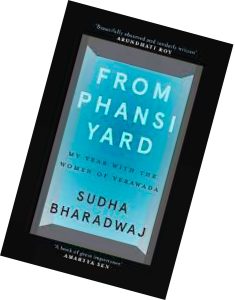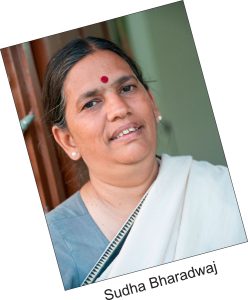A cage with a view
This beautifully observed and tenderly written book about life inside a prison teaches us a great deal. A must-read.
I would read anything written by Sudha Bharadwaj because of the extraordinary woman she is and the extraordinary life she has lived,’ Arundhati Roy, fearless commentator on our lives and times, is quoted as saying on the back cover of From Phansi Yard: My Year with the Women of Yerawada. It’s a reminder of the fact that India is a nation of extraordinary women, vast numbers of whom manifest their extraordinariness simply by being. It’s a reminder that, as a people, we lay claim to a hoary civilisation that is believed to accord great respect to woman and womanhood. Sudha Bharadwaj’s vignettes of about 70 women she met during her incarceration in Yerawada Jail, Pune, from November 2018 to February 2020, reveal that they showed her ‘how to survive injustice, how to remain hopeful… how to continue to live, love, fight and laugh, even behind bars.’

But first, who is Sudha Bharadwaj? To quote from the book: she is ‘…a respected trade unionist and human rights lawyer who has worked for over three decades for the rights of the poor in Chhattisgarh. Born in Boston to parents who were academics, she gave up her American passport to become an Indian citizen. After a five-year Master of Science degree in Mathematics from IIT Kanpur, she went on to work in Chhattisgarh as a trade unionist. At 39, Sudha also qualified as a lawyer. In 2018, she was arrested, as were several scholars, lawyers and activists, under the Unlawful Activities (Prevention) Act (UAPA) on the charge of inciting violence in the Bhima Koregaon village in Maharashtra.’ She was working as a visiting professor at the National Law University in Delhi when she was put under house arrest. She spent over three years in prison, at Yerawada and then Byculla Jail, Mumbai. She was released on bail in December 2021.
Sudha dedicates her book ‘to all the unjustly incarcerated,’ and her daughter ‘who suffered my absence the most.’ Truly, the unjustly incarcerated and their children are the biggest sufferers. The introduction, done like an interview, giving readers a glimpse into the author’s background, both personal and professional, is an eye-opener. For instance, to the question, ‘Can you be called a dissident?’, Sudha responds: ‘If that means do I dare speak against corporates, against governments, against powerful people when they are tyrannical?… Yes. But I also believe that I am a deeply Constitution-abiding person. I have striven for and will continue to strive for justice, liberty, equality and fraternity for every citizen around me. Is that dissidence?’
She tells us how the book came to be written: ‘Some prisoners pray, some weep, some just put their heads down and work themselves weary. Some fight defiantly every inch of the way, some are inveterate grumblers, some spew gossip. Some read the newspaper from cover to cover, some shower love on children, some laugh at themselves and at others. I watched through the bars, and I wrote.’ She bought notebooks from the jail canteen and wrote at night in a single cell, ten paces by six paces small, in the phansi yard (death row) of the women’s jail, Yerawada. In the adjoining cell is a co-accused in the Bhima-Koregaon case, Professor Shoma Sen. They are never told why they were in the high-security death row unit; presumably because they were held under the draconian UAPA. On her other side are two sisters, held for the last 24 years. She has ‘a cage with a view’ thanks to bars on one side overlooking the yard.
From one winter to the next, with summer and monsoon in between, Sudha watched and listened as bits and pieces of inmates’ stories unravelled, leading her to wonder about life, justice, society, systems and much more. The first sketch is of a Maratha girl she meets in the Faraskhana lock-up in Pune where the author is first taken. The girl seems like any modern, middle class, working girl as she speaks animatedly about how she eloped with and married her Tamil boyfriend. She is in for supposedly abetting a rape.

It appears that many of the imprisoned women come from bad marriages. This Dalit nurse, for instance, is daughter of an Army man. After the death of her abusive and alcoholic husband, she moved in, along with her two small children, with her muhbola brother and his wife. There she endured the taunts of the wife, even though she contributed to the family’s kitty. She worked as a day nurse at a private home and was pressured to work nights too. Eventually she joined a hospital. However, her previous employers accused her of stealing jewellery and here she was, in jail. She was happy her daughter wanted to join the police force. Yet, observes the author, ‘Considering how much caste discrimination there is within the police, I don’t know whether to feel happy or disappointed for her.’
Sudha acquaints readers with various aspects of prison life with a keen, yet objective eye. We meet law enforcers, we see prisoners given responsible duties, we see how the canteen works, how food is distributed, how supportive families send monthly stipends to the imprisoned while those with no support languish or do odd jobs for fellow inmates or rely on generosity. Some women have husbands or partners in the neighbouring men’s jail which, relatively speaking, is better off in terms of facilities, although Yerawada jail overall is clean and relatively well organised. However, there is groupism and cronyism, much as in the world outside, loneliness and jealousy, as well as desperation.
Some prisoners pray, some weep, some just put their heads down and work themselves weary. Some fight defiantly every inch of the way, some are inveterate grumblers, some spew gossip. I watched through the bars, and I wrote.
Sudha Bharadwaj
on how she came to write the book.
The author writes about a woman who doesn’t know why she is there but she sometimes breaks tunefully into Hindi film songs; she appears to have Parkinson’s, she tends to eat a lot, and she falls asleep anywhere. Sometimes she weeps to go home. Yet, says the author, ‘in their own strange way, everyone cares for her. They humour her, they crack jokes, give her extra food.’ And there are others clearly from upper class backgrounds. One of them, doing time for embezzlement, tells the author, ‘I have learnt and understood so much about life after coming to jail, which I never could have otherwise.’ Another woman, from a middle class background, takes to teaching the children who are there with their mothers, and yoga to the women. Children are allowed to live with their mothers up to a certain age, after which they are sent off to sansthas. Generally beloved, their departure is a difficult time for their own and ‘other’ mothers. They are usually the objects of everyone’s affection. Sudha observes that legal services to the women inside is inadequate, and is an area that needs reform, especially in the case of convicted prisoners, who ‘do not even seem to know the status of their appeals in the high court or Supreme Court’.
Faith plays a big role in prison life. Regardless of individual affiliation, most of the women, the author finds, respect each other’s religion: everyone keeps roza and everyone celebrates Diwali. On Women’s Day, there are many talents on display. Now, with bail terms confining her to Mumbai, Sudha says she thinks often of her fellow prisoners. Sometimes she gets a phone call from an unknown number: ‘Hey Aunty, remember me?’ and that brightens up her day.
The columnist is a children’s writer and senior journalist
